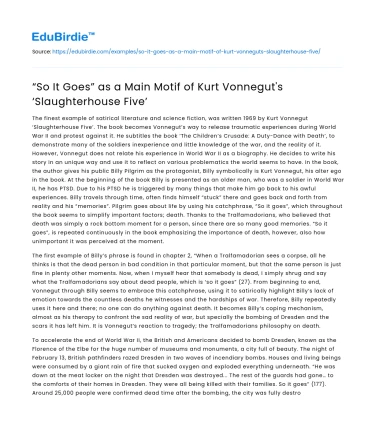The finest example of satirical literature and science fiction, was written 1969 by Kurt Vonnegut ‘Slaughterhouse Five’. The book becomes Vonnegut’s way to release traumatic experiences during World War II and protest against it. He subtitles the book ‘The Children’s Crusade: A Duty-Dance with Death’, to demonstrate many of the soldiers inexperience and little knowledge of the war, and the reality of it. However, Vonnegut does not relate his experience in World War II as a biography. He decides to write his story in an unique way and use it to reflect on various problematics the world seems to have. In the book, the author gives his public Billy Pilgrim as the protagonist, Billy symbolically is Kurt Vonnegut, his alter ego in the book. At the beginning of the book Billy is presented as an older man, who was a soldier in World War II, he has PTSD. Due to his PTSD he is triggered by many things that make him go back to his awful experiences. Billy travels through time, often finds himself “stuck” there and goes back and forth from reality and his “memories”. Pilgrim goes about life by using his catchphrase, “So it goes”, which throughout the book seems to simplify important factors; death. Thanks to the Tralfamadorians, who believed that death was simply a rock bottom moment for a person, since there are so many good memories. “So it goes”, is repeated continuously in the book emphasizing the importance of death, however, also how unimportant it was perceived at the moment.
The first example of Billy’s phrase is found in chapter 2, “When a Tralfamadorian sees a corpse, all he thinks is that the dead person in bad condition in that particular moment, but that the same person is just fine in plenty other moments. Now, when I myself hear that somebody is dead, I simply shrug and say what the Tralfamadorians say about dead people, which is ‘so it goes” (27). From beginning to end, Vonnegut through Billy seems to embrace this catchphrase, using it to satirically highlight Billy’s lack of emotion towards the countless deaths he witnesses and the hardships of war. Therefore, Billy repeatedly uses it here and there; no one can do anything against death. It becomes Billy’s coping mechanism, almost as his therapy to confront the sad reality of war, but specially the bombing of Dresden and the scars it has left him. It is Vonnegut’s reaction to tragedy; the Tralfamadorians philosophy on death.
Save your time!
We can take care of your essay
- Proper editing and formatting
- Free revision, title page, and bibliography
- Flexible prices and money-back guarantee
To accelerate the end of World War II, the British and Americans decided to bomb Dresden, known as the Florence of the Elbe for the huge number of museums and monuments, a city full of beauty. The night of February 13, British pathfinders razed Dresden in two waves of incendiary bombs. Houses and living beings were consumed by a giant rain of fire that sucked oxygen and exploded everything underneath. “He was down at the meat locker on the night that Dresden was destroyed... The rest of the guards had gone… to the comforts of their homes in Dresden. They were all being killed with their families. So it goes” (177). Around 25,000 people were confirmed dead time after the bombing, the city was fully destroyed and death could be smelled in the air. “Dresden was like the moon now, nothing but minerals. The stones were hot. Everybody in the neighborhood was dead. So it goes” (178). Vonnegut makes a strong emphasis during the book, specially on this exact date, where he seems to find himself confused. He was a 17 year old soldier, who had just been part of a massive massacre, and after a few years he finds himself accepting what happened, there was nothing that could have been done, so it goes.






 Stuck on your essay?
Stuck on your essay?

